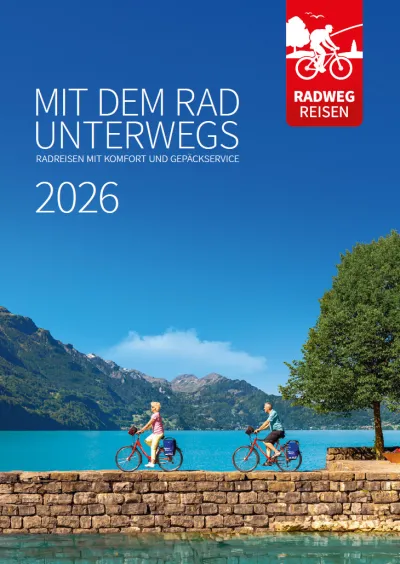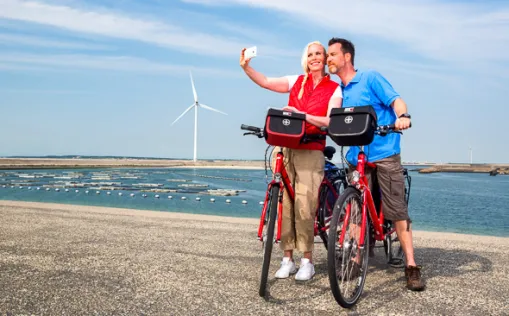

Pure nature in the south of Portugal: the hinterland & coastal tour
Escape the approaching winter in Germany, spend a few warm days on an e-mountain bike and bring the cycling season to a relaxed close. This works wonderfully in the Algarve! - A travel report by our colleague Alex Kaufenstein

© BLDWRK.de
As a long-standing employee of Radweg-Reisen, I also take the opportunity once a year to test our own trips or those of our partner tour operators in detail.
As I have been very busy during the German cycling season with lots of projects, our increasing number of guests and my dog, it is now November and I am on my way south. More precisely, to the south-west end of Europe. The Portuguese Algarve!
05.11. - From rain to sun
On a rainy November morning, we take a direct flight from Lake Constance via Zurich to the Algarve. From the airport, we take a cab to the Hotel Eva, which is located directly on the harbor of the "Algarve capital" Faro. After a warm welcome and a briefing on the bike tour by Rita & Louis, the staff of our partner tour operator, I go for a walk and enjoy the sunset.
Show more Show less06.11. - From the Spanish border into the middle of the Serra
After breakfast on the roof terrace, Louis picks me up at 9.30 a.m. and we drive to Azinhal, a small village on the Spanish border, the actual starting point of the cycle tour. He invites me for a coffee and I fill up my water supply for the tour.
A quick descent takes us to the Guardiana border river right at the start. The route heads north along the riverbank past abandoned houses to climb the first ascent. Once at the top, a steep and washed-out path leads to Odeleite and the reservoir of the same name.
Single country roads, parts of the long-distance hiking trail "Via Algarviana" lead me through the deserted "Serra do Caldeirão". After some steep climbs, long descents and a few stream crossings, I reach the "Casas d'Aleida" in Vaqueiros, my destination for the day.
Show more Show less07.11. - From Vaqueiros to Barranco do Velho
We get back on our bikes under a bright blue sky. According to the travel documents, steadily uphill. Lonely paths, small villages, tree plantations and small ruins are on the agenda. I also discovered the first strawberry trees, the fruit of which is used to make the traditional fruit brandy "Aquardente de Medronho".
During the day, the "steady uphill" of the travel documents turned into almost 1400 meters of altitude, which was compensated for by magnificent views and rapid descents. No problem thanks to the e-mountain bike! The last part of the route takes me through a eucalyptus forest to Barranco do Velho and the "Tia Bia" inn.
Show more Show less08.11. - From the Serra to the Litoral - it's all downhill!
From Barranco, the route follows a high-level trail on the "Via Algarviana" through a nature reserve. The view over the Serra is breathtaking!
After the high-level trail, the route is breathtaking. Almost six kilometers of winding downhill over gravel, paths and through stream beds. The latter are not a problem in early November, as there is little water here anyway. Through olive groves lined with natural walls, alternating with almond, baobab and citrus trees, I reach the "Fonte Grande de Alte", a public bathing area in the river Alte. At the hotel of the same name above the village, I enjoy my "Sagres" today with a magnificent sunset.
Show more Show less09.11. - From Alte to the Atlantic
After a quick visit to the breakfast buffet, I set off. I take a leisurely ride along a country road towards Sao Bartolomeu de Messines and on to the "Barragem do Funcho". I more or less follow the banks of the reservoir on winding natural paths. Occasionally I catch a brief glimpse of the Atlantic in the distance. Through a fertile valley, I reach the fortified town of Silves and take a short break at the "Art'aska lounge Café" on the Rio Arade.
After leaving the Arade & Odeluca delta behind me, I reach the coastal town of Portimao. Compared to the sleepy and relaxed villages of the last few days, Portimao feels like a package holiday town. Sandy beaches, hotels and bars without end. If you like it... luckily it's low season and it's really quiet here.
Show more Show less10.11. - From Portimao to Luz
In the morning, I enjoy the peace and quiet on the beach and the first view of the typical rocky coastline. I cycle west along the panoramic coastal path. Secluded bays and rugged cliffs alternate again and again.
In the fishing village of Alvor, I treat myself to an espresso at the harbor and watch the hustle and bustle around a fisherman. Unfortunately, the only way to cross the delta of the Alvor estuary is the national road 125 (lots of traffic, traffic jams, roadworks and that's already in November...) But after about 7 km I can leave the stress behind me and am back on the road right by the sea. Shortly before Lagos, I have a delicious orange cake. The real Algarve, the "Costa d'Oiro", begins at Lagos' lighthouse, the Ponta da Piedade: The golden yellow cliffs with countless bays and rocky bridges. Even before I reach the hotel, I experience another impressive sunset. Tonight I'm staying at the Quinta do Mar da Luz.
Show more Show less11.11. - ...to the end of the world
I'm on my last stage today. With short climbs, I cycle via Burgau to the "Forte de Almadena". A ruin right on the cliffs. I can already see Sagres in the distance. On the way from the coast into the hinterland to Raposeira, I pass a menhir, which bears witness to the settlement of the Algarve in the period 3000-4000 BC. Raposeira is also home to the oldest Gothic church in the Algarve, which was built by Heinrich the Navigator. I head for the Sagres lighthouse via a plateau and a long straight side road. At Vale Santo, I decide to leave the suggested route and head directly west along a sandy path. And what can I say? I have arrived at the "end of the world"! After a long break, I visit the most south-westerly point in Europe: Cabo de Sao Vicente.
Show more Show less12.11. - ...off home :-(
After breakfast, I was picked up by Louis and driven to Faro, where I spent the time until my flight home on a tour of the city.
I was most impressed by the first and last days. The vast and deserted landscape of the Serra in combination with the physical exertion had an almost meditative effect on me. The "pulsating" life on the coast only slightly interrupted the mental relaxation. Arriving at the "end of the world" was the impressive end to a fantastic week!
Show more Show less















































